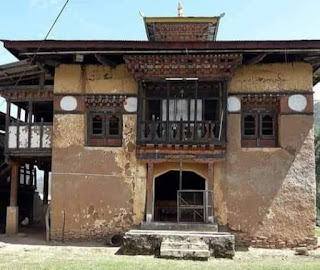BROADNESS OF THE TERM "NGAR"
Not being an etymologist has contributed to my initial apprehension in interpreting the significance of the term "ngar" as articulated by His Majesty the King during the 114th National Day address. The influx of inquiries and requests for my interpretation of this esteemed word via Messenger has prompted me to venture into this endeavor, albeit with a degree of humility.
Prior to the King's emphasis on the term "ngar," I had not fully grasped its extensive connotations and profound implications, despite its common usage among native speakers primarily in reference to metallurgical properties such as hardness and durability. However, its meaning transcends these literal interpretations. Natives often use the phrase མི་དེ་ངར་ཡེང་འདུག to commend an individual for their physical or intellectual prowess, resilience, and perseverance. Yet, the essence of "ngar" encompasses a broader spectrum; it signifies 'grit' coupled with a robust moral compass. In essence, 'grit' encapsulates the essence of 'ngar.'
Recall that in a previous National Day address, His Majesty employed the phrase "Jignang Maybi Nyingtoph." However, this phrase did not resonate widely with the general public beyond certain educated circles due to its complexity. Thus, in my view, "ngar" can be equated to a layman's interpretation of "Jignang Maybi Nyingtoph." This simplified directive, centered around the keyword 'ngar,' has been readily understood and embraced by the populace. Social media platforms were inundated with discussions immediately following the National Day speech, with citizens exploring various applications of 'ngar.'
'Ngar' carries a majestic potency in its literal sense, resonating akin to the commanding roars of apex predators in the animal kingdom. In Dzongkha, expressions like 'singye ngar,' 'tah ngar,' and 'zee ngar' symbolize the roars of lions, tigers, and leopards, embodying traits of courage and bravery. Thus, one interpretation of 'ngar' involves embodying courage in pursuit of altruistic national objectives.
While there exists a subtle distinction between the metallic connotation of 'ngar' and its roar-like interpretation, linguistically, this difference is negligible and hinges on homonyms and heteronyms. Both connotations, whether denoting metallic resilience or the courage, strength, and ferocity akin to tigers, lions, and leopards, are articulated and spelled identically (ངར) and share a common essence. When the King implores us to "name and shame" and exhibit courage in rooting out corrupt public officials, it necessitates the fortitude of a lion and the resilience of iron. Instances of complacency and leniency have inadvertently facilitated the persistence of malpractice.
In summary, a plethora of adjectives, including but not limited to those enumerated below, encapsulate the essence of 'ngar' as elucidated by the King: grit, courage, strength, resilience, fortitude, decisiveness, audacity, and others.
As the Latin adage posits: "Fortune favors the bold.”
Some common usages of 'ngar' in Dzongkha:
མི་དེ་ངར་བར་ངར་དྲག་ཡོད། མོ་ལཱ་ངར་ཡེང་ཡོད། ངར་འབར་ལཱ་འབདཤིག ། སེམས་ངར་རུས་ལྕགས་འདེ་དགོ ། མི་དེ་ སྟག་ངར་ངར་ གཟིག་ངར་ངར་འདུག །



Comments
Post a Comment